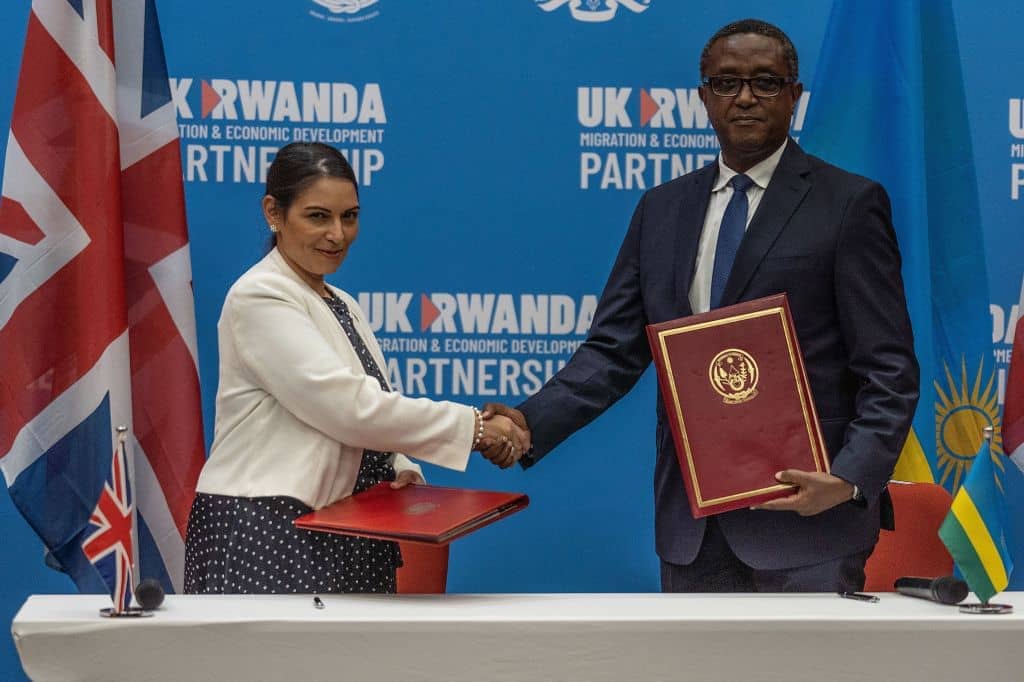Why is Priti Patel trying to send some asylum seekers to Rwanda? Is it to stop so many of them drowning in the Channel after their people smugglers’ inflatable boats have sunk? Is it to help develop the Rwandan economy? Or is this purely a political move?
The Home Secretary naturally claimed the first two justifications for her new policy when she gave a statement about it in the Commons this afternoon, and faced accusations from the Opposition that she was really pursuing the third. The most stinging criticism came not from the Labour frontbench, though, but from one of Patel’s own Conservative predecessors as Home Secretary, former prime minister Theresa May.
May has, of course, been very critical of a whole range of government policies
May told the Commons that ‘with respect to my right honourable friend, and from what I’ve heard and seen so far of this policy, I do not support the removal to Rwanda policy on the grounds of legality, practicality and efficacy’. She then warned that it would likely increase trafficking of women and children.
May has, of course, been very critical of a whole range of government policies. But it is still significant that the Home Secretary who presided over a ‘hostile environment’ policy was prepared to criticise this move in such strong terms today. Patel made clear what she thought of that by calling May the ‘honourable lady’ rather than ‘my honourable friend’, as is the custom when members of the same party are speaking.
Patel was still far more combative with opposition members who attacked her statement, describing Yvette Cooper as producing ‘synthetic’ outrage in response to it, and accusing the SNP’s Stuart McDonald of a ‘slur’. Later, she said the criticisms were bordering on xenophobia. She refused to offer a number of important details, including the cost per asylum seeker, despite repeated calls to do so from MPs, including former International Development Secretary Andrew Mitchell, who complained that MPs weren’t being given the details before they were due to vote on it tomorrow. Patel’s line on this to Cooper was ‘you can’t put a cost on human lives’.
The rest of the Tory reception went from general concern to a later spate of attempts to show support from the backbenches. This was in part because Boris Johnson was running late for his own statement which was scheduled to follow Patel’s, and Tory MPs were being encouraged to ask questions to keep it going and to make it seem as though the policy was landing well. Patel did get praise from Natalie Elphicke, Sir Edward Leigh and Andrea Leadsom, among others. Leadsom supported the policy and lambasted its critics on the grounds that Something Must Be Done to stop the deaths in the Channel. She did not, however, offer any evidence that this particular policy was the Thing that would help in any way at all. Later Bob Neill endorsed these aims while expressing some concern that the policy in question wouldn’t actually achieve them.
And the chasm between Something Must Be Done and the Rwanda plan reveals what its real purpose is. The Home Secretary did not offer any evidence that this policy would save lives – or at least not real ones, as opposed to political ones. Not only does the row about the partnership with Rwanda take away some of the fury around Partygate, it also allows Patel to suggest that after years of failing to do what she has promised and stop the Channel crossings, she is getting control.
At the very end of her statement, Patel was asked a supportive question by Conservative backbencher Andrew Bridgen who said ‘I believe that this policy will work’, and then asked her to offer some estimates of the impact on the numbers of people prepared to put their lives in the hands of people smugglers. Patel didn’t do that, so Bridgen and others will have to stick to believing the policy will work, because faith and belief are the only basis on which someone could currently accept it, rather than anything more evidence-based.







Comments